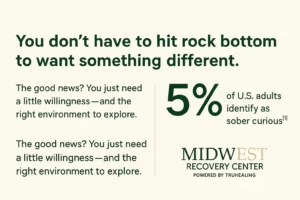You don’t have to hit rock bottom to want something different.
Maybe you’ve been drinking more than you’d like, or maybe it just isn’t working for you the way it used to. You’re not in a crisis. You’re not even sure if you’d call it addiction. But something’s shifted. You’re starting to ask bigger questions. That’s what being “sober curious” is all about—and it’s valid.
The good news? You don’t need a label to start looking for support. You just need a little willingness—and the right environment to explore.
At Midwest Recovery Center’s alcohol addiction treatment program in Toledo, Ohio, we meet you where you are. Whether you’re sober curious or looking to cut back, here’s how to find a treatment path that fits your life, not someone else’s expectations.
1. Get Clear on Your Why (Even If It’s Still Evolving)
Most treatment searches start with a question: “Do I really need help?”
If you’re not waking up with shakes or facing serious consequences, it’s easy to feel like you don’t “qualify” for treatment. But recovery isn’t about checking a box—it’s about building a better relationship with yourself.
Maybe you want to drink less. Maybe you want to stop entirely. Maybe you’re just tired of wondering if you should cut back. All of those reasons are enough. You’re allowed to want more clarity, more peace, more mornings without regret.
Instead of asking, “Am I bad enough for treatment?” try asking, “Would life feel better with support?” If the answer is “maybe,” keep going.
2. Look for Outpatient Treatment That Honors Your Schedule
If you’re managing work, family, or other responsibilities, inpatient treatment might feel impossible. The good news is, it’s not your only option.
Outpatient alcohol addiction treatment offers a flexible path forward. You can attend therapy, group support, and skill-building sessions during the day or evening—without putting your entire life on pause. It’s structured enough to help you make real changes, but fluid enough to fit into a “normal” week.
Many of our clients in Perrysburg or Maumee, Ohio work full time, care for families, or are just trying to keep their routines stable. Outpatient care lets you grow without upending everything.
3. Choose a Program That Supports Exploration, Not Just Abstinence
Not everyone walks into treatment ready to declare lifelong sobriety—and that’s okay.
Some programs assume total abstinence is the only goal. But if you’re still figuring out what you want, a good treatment center will give you space to explore without pressure. Look for language like:
- “Sober curious friendly”
- “Motivational interviewing”
- “Individualized goals”
- “Harm reduction options”
These are signs that the program understands you might be unsure—and they’re equipped to help you move at your own pace.
At Midwest Recovery, we don’t require you to know everything before you start. We just ask that you be honest—and open to finding what works for you.

4. Think Beyond “Treatment” — Consider Whole-Person Wellness
The reasons people drink often run deeper than just habit. Maybe it’s stress, anxiety, loneliness, burnout, or a mix of all of them. Real change happens when treatment helps you address the why—not just the behavior.
Ask any center you’re considering:
- Do they offer mental health counseling?
- Can you work on anxiety, trauma, or relationship stress as part of your treatment?
- Do they help with routines, sleep, nutrition, or goal setting?
At Midwest Recovery, we focus on whole-person support. That means helping you build a life that feels sustainable, connected, and grounded—whether or not you ever label yourself “in recovery.”
5. Look for Programs That Make You Feel Seen
Let’s be honest: not every treatment center will feel like your people.
Some feel too clinical. Some are overly strict. Some just don’t feel right. That’s not a reflection on you—it’s just chemistry.
The right program will make you feel respected, heard, and safe to ask questions. If you feel judged or rushed in your first conversation, trust your gut. You’re not being difficult. You’re protecting your growth.
When you call Midwest Recovery, you’ll talk to someone who knows this space—and knows how vulnerable it can feel to reach out. We’ll walk you through what to expect, listen to what you’re hoping for, and help you find your next step—even if it’s not with us.
6. Consider Staying Local for Easier Access and Ongoing Support
Treatment works best when it’s consistent and close to home.
If you live near Toledo, Oregon, or other nearby areas in northwest Ohio, finding local care makes follow-through easier. You’ll spend less time driving and more time healing. Plus, local programs like ours often offer continuing support after your main program ends—through alumni groups, ongoing counseling, or flexible aftercare options.
Looking for alcohol addiction treatment in Oregon, Ohio? Our team welcomes people from across the region—and builds support that fits their local lives.
7. Let the First Step Be Just That—A Step
You don’t need to commit to lifelong sobriety to call.
You don’t need to have a plan.
You don’t even need to be sure that alcohol is the problem.
You just need to be willing to ask, “Could something be different?”
We’re here to help you answer that question—not for us, but for you.
Frequently Asked Questions About Sober-Curious Alcohol Treatment
What does “sober curious” actually mean?
Being sober curious means you’re exploring your relationship with alcohol—even if you’re not sure you want to quit. It’s about asking honest questions, noticing patterns, and choosing more intentionally.
Do I have to stop drinking completely to enter treatment?
Not necessarily. At Midwest Recovery, we work with people across the spectrum—from those seeking full sobriety to those just looking to reduce use or understand their patterns. We’ll help you clarify what you want and support you in reaching that goal.
Is outpatient treatment really enough if I don’t feel “out of control”?
Absolutely. Outpatient care is ideal for people who are functioning day-to-day but still feel like alcohol is getting in the way of how they want to live. It’s not about crisis—it’s about choosing clarity, balance, and support.
How do I know if Midwest Recovery is the right place for me?
Call us. There’s no pressure. We’ll listen, ask questions, and help you decide whether our approach fits what you’re looking for. If we’re not the best fit, we’ll point you somewhere that is.
What if I’m nervous to make the call?
You’re not alone. Many of us on staff have been exactly where you are. We know that calling takes courage—and we’ll meet you with kindness, not pressure.
Ready to explore your next step?
Call (888) 657-0858 or visit Midwest Recovery Center’s alcohol addiction treatment program in Toledo, Ohio to find care that meets you where you are—not where someone else says you should be.


























